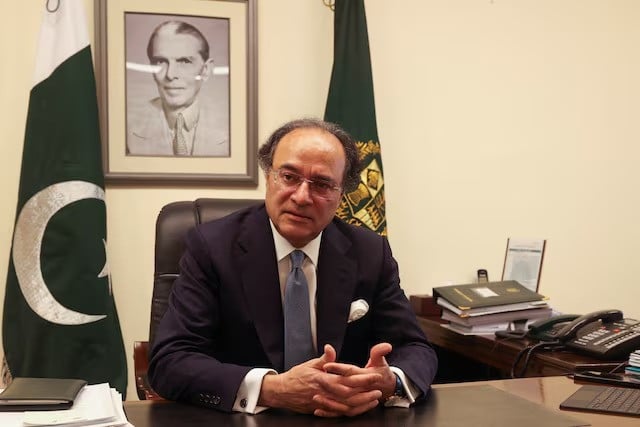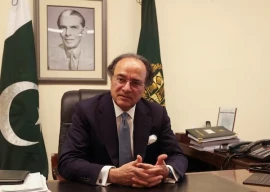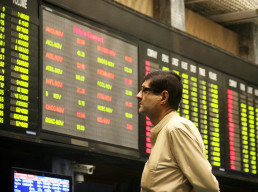
Finance Minister Muhammad Aurangzeb has assured that no mini-budget is forthcoming, describing recent talks with the International Monetary Fund (IMF) as "constructive and purposeful."
In an interview with a private television channel, Aurangzeb emphasised Pakistan’s commitment to achieving its ambitious tax collection target of Rs12.97 trillion through improved enforcement and administrative measures.
He highlighted the government’s successful attainment of the primary surplus target as a key milestone in the country’s economic stability efforts.
The minister further shared that the National Fiscal Pact had received cabinet approval, ruling out the need for revisions to the National Finance Commission (NFC) framework.
He expressed gratitude towards Sindh’s Chief Minister for supporting the fiscal pact, acknowledging the positive role of Khyber- Pakhtunkhwa (K-P) in matters of national interest.
Aurangzeb also addressed the recent setback in the privatisation process of Pakistan International Airlines (PIA), noting that while the failed bid was disappointing, efforts to advance privatisation will continue.
IMF board to decide on Pakistan case
Meanwhile, the International Monetary Fund has decided to place the findings of an unplanned visit to Pakistan before the executive board for a decision after it observed that the $7 billion programme implementation was lagging behind on many counts.
In an official announcement at the end of the five-day visit to Pakistan, the IMF said that “based on the preliminary findings of this mission, staff will prepare a report that, subject to management approval, will be presented to the IMF’s Executive Board for discussion and decision”.
The issues highlighted by the IMF in its statement suggests that the three-year Extended Fund Facility took a bumpy start soon after beginning of the journey on September 25th when the board approved the package.
Led by Mission Chief Nathan Porter, the IMF team visited Pakistan from November 11th to 15th to review implementation on about 40 conditions that the government had accepted.
The IMF shared its “preliminary findings” through the press release and stated that the detailed findings in the shape of the report would be presented before the Executive Board.
The IMF’s Mission Chief stated that Pakistan and the IMF staff “agreed with the need to continue prudent fiscal and monetary policies, revenue mobilization from untapped tax bases, while transferring greater social and development responsibilities to provinces”.
The issues that Nathan mentioned after the emergency visit are the ones where Pakistan is lagging behind the commitments, said the sources.
In order to meet the IMF’s condition to sign a National Fiscal Pact by four provinces and the Centre till September 30th, the signatories agreed to a muted version that excluded transfer of Benazir Income Support Programme (BISP) to the provinces. The agreement also allowed exception to the condition of handing over the province-specific development project to the respective federating unit.
Now the IMF has emphasized in its press statement about the need for “transferring greater social and development responsibilities to provinces”.
The fiscal pact had been conceived to transfer the expenditure responsibilities that the Center has unconstitutionally taken on its shoulders despite not having fiscal space. The signed version did not achieve this objective.
The Federal Board of Revenue also could not meet its overall tax collection targets and failed to collect due taxes from the traders. The IMF has now pressed in the statement to ensure continued implementation of “prudent fiscal policies (and) revenue mobilization from untapped tax bases”.
The sources said that once the IMF gives its detailed report to management and the board only then the situation on the amount and the timing of the mini-budget would be decided. Punjab has also passed the Agriculture Income Tax law but the enactment gives the authority to set the rates to the government through notification.
Nathan Porter said that there was also a need for structural energy reforms and constructive efforts are critical to restore the sector’s viability.
The sources said that the discussions were held around how to encourage the use of electricity from the national grid and reduce the cost –in a situation that is the direct outcome of the wrong IMF policies under the previous and the current programmes.
Porter said that “Pakistan should take steps to decrease state intervention in the economy and enhance competition, which will help foster the development of a dynamic private sector”.
To achieve the objective of decreasing the state intervention in the economy, the IMF has already placed conditions related to the functioning of the Special Economic Zones and drastic changes in the Pakistan Sovereign Wealth Fund Act.
“Strong programme implementation can create a more prosperous and more inclusive Pakistan, improving living standards for all Pakistanis”, said Nathan Porter.
“We had constructive discussions with the authorities on their economic policy and reform efforts to reduce vulnerabilities and lay the basis for stronger and sustainable growth”, said Porter.
He said that the IMF was encouraged by the authorities’ reaffirmed commitment to the economic reforms supported by the 2024 Extended Fund Facility (EFF). The next mission associated with the first EFF review is expected in the first quarter of 2025, he added.
During the five-day visit, the IMF team engaged with the federal and provincial governments, the State Bank, as well as representatives from the private sector on economic developments and policies.
The IMF said that the staff visits are a standard practice for countries with semi-annual programme reviews and aim to engage with the authorities and other stakeholders on the country’s economic developments and policies and the status of planned reforms.
However, the sources said that no one in Pakistan anticipated and expected the IMF to come only after six weeks of the programme approval.

1731583017-0/diddy-(42)1731583017-0-165x106.webp)


1719315628-0/BeFunky-collage-(8)1719315628-0-165x106.webp)


1724926799-0/Untitled-design-(7)1724926799-0-270x192.webp)
1731829534-0/Copy-of-Untitled-(9)1731829534-0-270x192.webp)

1731829111-0/Copy-of-Untitled-(8)1731829111-0-270x192.webp)








COMMENTS
Comments are moderated and generally will be posted if they are on-topic and not abusive.
For more information, please see our Comments FAQ